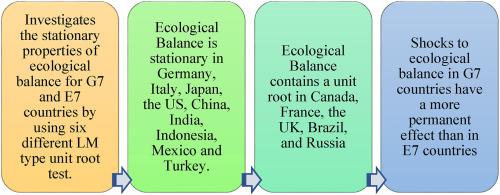Journal of Cleaner Production ( IF 9.7 ) Pub Date : 2020-09-19 , DOI: 10.1016/j.jclepro.2020.124294 Veli Yilanci , Ugur Korkut Pata

|
Ecological balance can be described as the difference between ecological footprint and biocapacity. It is an important indicator of sustainable and environmental development. In this regard, the current study aims to determine whether policies on ecological balance are effective in G7 and E7 countries, covering the period of 1961-2016. To this end, we use the Lagrange Multiplier (LM) unit root test, LM unit root test with structural breaks, and Fourier LM unit root test, as well as more powerful versions of these tests to investigate the stationarity of the ecological balance. We also examine the effectiveness of policies regarding ecological footprint and biocapacity. The empirical results obtained from both linear and non-linear unit root tests show that ecological balance is stationary in Germany, Italy, Japan, the US, China, India, Indonesia, Mexico, and Turkey, while it is non-stationary in the remaining five countries. However, the findings based on the structural break unit root tests suggest that ecological balance is stationary in more countries. Finally, the overall results indicate that shocks to the ecological balance in G7 countries have a more permanent effect than in E7 countries. Therefore, G7 countries can better apply environmental protection policies than E7 countries can in the long term. In Brazil, Canada, France, Russia, and the UK, environmental policies can be effectively implemented to regulate ecological balance.











































 京公网安备 11010802027423号
京公网安备 11010802027423号